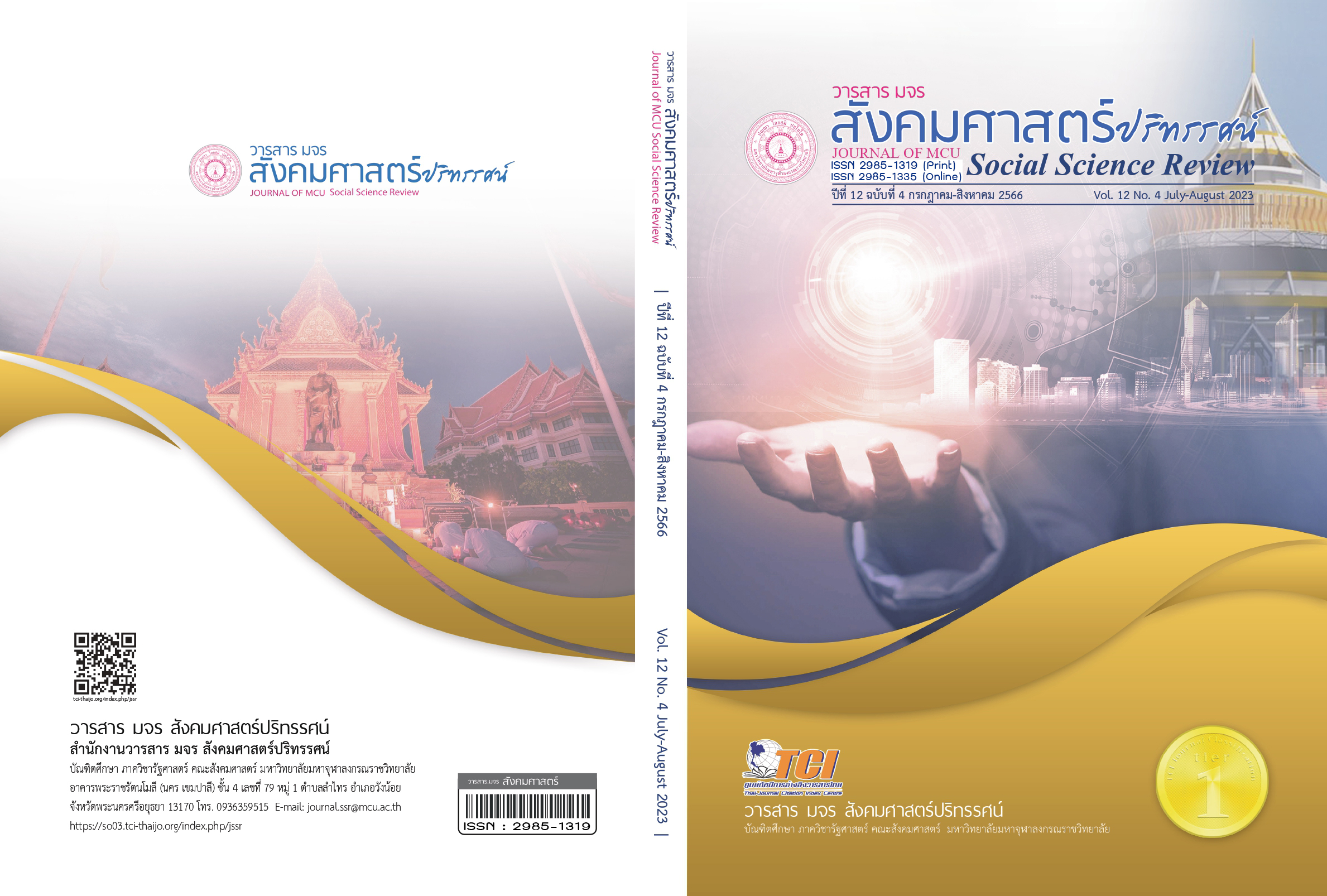ปัจจัยที่ส่งผลต่อความจงรักภักดีของนักท่องเที่ยวผู้สูงอายุชาวญี่ปุ่น ต่อการเดินทางมาพำนักที่จังหวัดเชียงราย ประเทศไทย
คำสำคัญ:
ความจงรักภักดีต่อจุดหมายปลายทาง, คุณภาพชีวิต, การท่องเที่ยวผู้สูงอายุ, นักท่องเที่ยวผู้สูงอายุชาวญี่ปุ่นบทคัดย่อ
การวิจัยครั้งนี้มีวัตถุประสงค์เพื่อ 1. ศึกษาปัจจัยด้านคุณลักษณะของจุดหมายปลายทางการท่องเที่ยวของจังหวัดเชียงรายส่งผลต่อความจงรักภักดีต่อจุดหมายปลายทางของนักท่องเที่ยวผู้สูงอายุชาวญี่ปุ่น และ 2. ศึกษาปัจจัยด้านคุณภาพชีวิตส่งผลต่อความจงรักภักดีต่อจุดหมายปลายทางของนักท่องเที่ยวผู้สูงอายุชาวญี่ปุ่น โดยใช้วิธีวิจัยเชิงปริมาณในการศึกษา กลุ่มตัวอย่าง คือ นักท่องเที่ยวผู้สูงอายุชาวญี่ปุ่นอายุตั้งแต่ 55 ปีขึ้นไป เคยเดินทางมาท่องเที่ยวและพักค้างคืนที่จังหวัดเชียงรายอย่างน้อย 2 คืน เก็บข้อมูลจากกลุ่มตัวอย่างจำนวน 400 คนด้วยแบบสอบถามออนไลน์ วิเคราะห์ข้อมูลด้วยสถิติเชิงพรรณนาและเชิงอนุมาน (Descriptive and Inferential Statistics) เช่น ร้อยละ (Percentage) ความถี่ (Frequency) และการวิเคราะห์การถดถอยพหุคูณ (Multiple Regression Analysis)
ผลการศึกษา พบว่า ปัจจัยด้านคุณลักษณะของจุดหมายปลายทางและปัจจัยด้านคุณภาพชีวิตส่งผลต่อความจงรักภักดีของนักท่องเที่ยวผู้สูงอายุชาวญี่ปุ่นต่อการเดินทางมาพำนักที่จังหวัดเชียงราย โดยคุณลักษณะของจุดหมายปลายทางที่ส่งผลต่อความจงรักภักดีของนักท่องเที่ยวผู้สูงอายุชาวญี่ปุ่น ได้แก่ ที่พัก กิจกรรมการท่องเที่ยว ความปลอดภัย และการบริการด้านการท่องเที่ยว ส่วนด้านคุณภาพชีวิต ได้แก่ สุขภาพกาย สุขภาวะทางอารมณ์ สถานการณ์ทางการเงิน และสัมพันธภาพในครอบครัวและสังคม
เอกสารอ้างอิง
Anantanakom, P. (2014). Long-stay Market Strategy: Further Studies on Cultural Background and Lifestyle of Target Groups. Retrieved March 20, 2020, from www.etatjournal.com/mobile/index.php/menu-read-tat/menu 2014
Bose, J., et al. (2021). The effect of destination image on destination loyalty - A Study Based on Visitor experience Perspective at Kochi, India. Wesleyan Journal of Research, 14(1), 37-42.
Cahyanti, S. D., et al. (2020). The Effect of Service Quality and Destination Attributes on Revisit Intention through Visitor Satisfaction at Hawai Waterpark Malang. South East Asia Journal of Contemporary Busines Economics and Law, 23(1), 76-85.
Chi, C. G.-Q., & Qu, H. (2008). Examining the structural relationships of destination image, tourist satisfaction and destination loyalty: An integrated approach. Tourism Management, 29(4), 624-636.
Cochran, W. G. (1977). Sampling Techniques (3rd ed.). New York: Wiley.
Duangkaew, S. (2019). Cross Cultural Interaction of Japanese Retirees through Clubs in Thailand. International Journal of Crime Law and Social Issues, 6(2), 75-90.
Esichaikul, R. (2012). Travel motivations, behavior and requirements of European senior tourists to Thailand. PASOS: Revista de Turismoy Patrimonio Cultural, 10(2), 47-58.
Gehrt, K. C., et al. (2007). The Emergence of Internet Shopping in Japan: Identification of Shopping Orientation-Defined Segments. Journal of Marketing Theory and Practice, 15(2), 167-177.
Kim, H., et al. (2015). Tourism experience and quality of life among elderly tourists. Tourism Management, 46(3), 465-476.
Hidayah, R. T., et al. (2021). The Increasing Intention of Tourist Loyalty Through Geopark Destination Attributes. Turkish Journal of Computer and Mathematics Education, 12(8), 316-321.
Jumanazarov, S., et al. (2020). Impact of Samarkand’s Destination Attributes on International Tourists' Revisit and Word-of-Mouth Intention. Sustainability, 12(5154), 1-17.
Lakpetch, P. (2017). Cluster Analysis of Psychographic Market Segmentation among Japanese Tourists and Causal Relationship Model with Determinants of their Decision-Makings for Long Stay Purposes in Thailand. Chulalongkorn Business Review, 39(153), 20-58.
Loureiro & Sandra. (2014). The role of the rural tourism experience economy in place attachment and behavioral intentions. International Journal of Hospitality Management, 40, 1-9.
Nakphin, S., & Buafai, T. (2018). The Causal Effects of Island Tourism Safety Perception toward Island Destination Loyalty of International Tourists: A Case of Samui Island, Thailand. Journal of International and Thai Tourism, 14(2), 26-47.
National Statistical Office of Thailand. (2020). International Tourist Arrivals to Thailand: 2010 - 2019. Retrieved March 20, 2020, from www.statbi.nso.go.th
Rohman, F. (2020). Determining Adventure Tourist Loyalty: Mediating Role of Tourist Satisfaction and Quality of Life. Journal of Asian Finance, Economics and Business, 7(10), 255-265.
Sangpikul, A. (2019). Factors of Destination Quality Influencing Tourists’ Destination Loyalty in visiting Phuket. Modern Management Journal, 15(2), 159-167.
Seabra, C., et al.. (2016). The Influence of Motivation in Tourists Involvement, Anatolia. An International Journal of Tourism and Hospitality Research, 27(1), 4-15.
Suarez, L., et al. (2020). Understanding Japanese consumer behaviour and cultural. African Journal of Hospitality, Tourism and Leisure, 9(1), 1-18.
TAT Review Magazine. (2018). From Past to Present: Thailand – Japan Tourism Exchange. Retrieved March 20, 2020, from www.tatreviewmagazine.com
Vieregge, M., et al. (2007). Mature travelers to Thailand: A study of preferences and attributes. Journal of Vacation Marketing, 13(2), 165-179.
Yoon, Y., & Uysal, M. (2005). An examination of the effects of motivation and satisfaction on destination loyalty: a structural model. Tourism Management, 26(1), 45-56.
ดาวน์โหลด
เผยแพร่แล้ว
รูปแบบการอ้างอิง
ฉบับ
ประเภทบทความ
สัญญาอนุญาต
ลิขสิทธิ์ (c) 2023 วารสาร มจร สังคมศาสตร์ปริทรรศน์

อนุญาตภายใต้เงื่อนไข Creative Commons Attribution-NonCommercial-NoDerivatives 4.0 International License.
เพื่อให้เป็นไปตามกฎหมายลิขสิทธิ์ ผู้นิพนธ์ทุกท่านต้องลงลายมือชื่อในแบบฟอร์มใบมอบลิขสิทธิ์บทความให้แก่วารสารฯ พร้อมกับบทความต้นฉบับที่ได้แก้ไขครั้งสุดท้าย นอกจากนี้ ผู้นิพนธ์ทุกท่านต้องยืนยันว่าบทความต้นฉบับที่ส่งมาตีพิมพ์นั้น ได้ส่งมาตีพิมพ์เฉพาะในวารสาร มจร สังคมศาสตร์ปริทรรศน์ เพียงแห่งเดียวเท่านั้น หากมีการใช้ภาพหรือตารางหรือเนื้อหาอื่นๆ ของผู้นิพนธ์อื่นที่ปรากฏในสิ่งตีพิมพ์อื่นมาแล้ว ผู้นิพนธ์ต้องขออนุญาตเจ้าของลิขสิทธิ์ก่อน พร้อมทั้งแสดงหนังสือที่ได้รับการยินยอมต่อบรรณาธิการ ก่อนที่บทความจะได้รับการตีพิมพ์ หากไม่เป็นไปตามข้อกำหนดเบื้องต้น ทางวารสารจะถอดบทความของท่านออกโดยไม่มีข้อยกเว้นใดๆ ทั้งสิ้น





